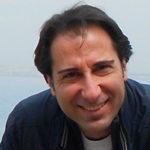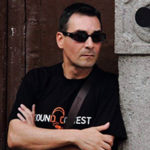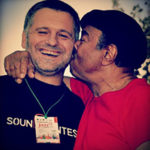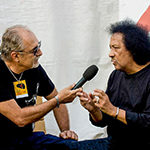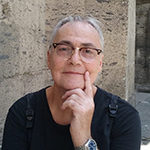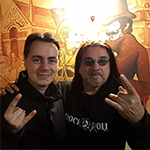A DEEP INSIDE interview with Hafez Modirzadeh, the american-iranian saxophonist, composer and academic ethnomusicologist who delivered one of the best avant-jazz albums in 2012, namely the sparkling, inventive and harmonically compelling Post-Chromodal Out! (PI Recordings). A successful cross-cultural metaphor in music that showcases his “chromodal” method and theory at its best.
Born in 1962 in Durham (North Carolina) of an iranian father and european-american mother, Hafez Modirzadeh grew up in France and in North California, where is currently living and teaching as Music Professor of world cultures at the San Francisco State University. In the past he played and collaborated with Don Cherry, Peter Apfelbaum, Fred Ho, Steve Lacy, Oliver Lake, Ornette Coleman and George Lewis, taking lessons in the persian “dastgah” in his formative years with the renowned musician Mahmoud Zoufonoun.
His invention of the “chromodal” method allows for a nonlinear improvisational practice which is able to adapt and incorporate multiple systems of music, permitting a cross-cultural conversation between instruments, performers, and different musical idioms. This peculiar approach was employed in a dozen releases, including the seminal 1993 In Chromodal Discourse, the critically acclaimed 1996 The People’s Blues, as well as the captivating Radif Suite recorded and released in 2010 in partnership with the american-iraqui trumpet player Amir ElSaffar.
 How did you start playing music and what were your masters in the beginning?
How did you start playing music and what were your masters in the beginning?
I was sitting alone at an abandoned grand piano in a large room at a German castle when I was 10 years old, and started playing melodies and couldn’t stop…my father sang Persian style around the house growing up in North Carolina, and later California…when I was 14 I heard a Charlie Parker record and couldn’t put the horn down … all the saxophone masters on record, and still living in the 70’s, I would go hear at places like the Keystone corner, in San Francisco…then I heard Mahmoud Zoufonoun, master Persian violinist, and he became my mentor.
According to your view, what’s the main feature of your music?
Emotion and urgency.
What memories have you got when thinking about your first album or project as a leader?
The sound of the group, and the trust, especially the hard work involved, and the energy … we spent five locked-out days at Cookie Merenco’s studio in Belmont, California, resulting in two complete discs, released some years apart.
What are the highlights of your career so far?
Ornette’s invitation to play together was certainly one highlight that stands out.
Who did you most enjoy collaborating or playing with?
There is no “most” … too many friends to name.
How do you pick and choose your collaborators and partners? How do you decide the instruments or the kind of musician you need?
By their sound and character, their honesty and humility, their range of expression, the trust and friendship felt in living and playing together.
Improvisation, composition, experimentation and tradition. How do they go together in your music and which of them do you seem to prefer?
They are all the same, aren’t they?
In your own view, what is special or different in your latest album “Post-Chromodal Out!” compared to the previous projects and recordings?
The re-tuned piano …
Have you got any remaining musical aspiration or goal that could fulfill yourself as an artist?
Not really … I hope to keep playing and sharing sounds.
What is special these days in your life?
My spouse, my three sons, the whole family … and the students at SF State.
What do you usually like doing when you don’t play (family, food, books, friends, cinema, sports, hobbies, travels, whatever)?
I live in a situation where I don’t play that often, so when I’m not playing, I’m thinking about playing, practicing in my head … otherwise, I like conversation that pushes the imagination, films and books that are biographical, or inspire endurance.
What kind of message do you wish to deliver or communicate by your music?
To cherish our relationships … to move with urgency and as much compassion as possible … many ideals that are difficult to express otherwise, but could lead towards healing.
What does you mostly scare when you’re playing?
I don’t understand the question…
What was the the worst place wherein you played and performed live and why?
Can’t think of any “worst” place I played … when I don’t play, it doesn’t matter, but when I do play, it matters a great deal.
What was the best place wherein you played and performed live and why?
Maybe it was in a dream … live performance always has its compromises…
What’s your most relevant defect as a musician?
Goal-orientation…
What was the worst thing or experience happened to you during your career?
Wouldn’t want to share negative experiences – who would it help?
And what was the best or the nicest one, instead?
Whenever my spouse comes to hear the music, and smiles.
What kind of music or artists do you mostly like listening to?
Any of the good saxophonists, I enjoy – I listen quite a bit to my own music, honestly, since I’m trying to improve it …
 What are, in your opinion, the most interesting or innovative musicians playing around at the moment?
What are, in your opinion, the most interesting or innovative musicians playing around at the moment?
Every one has something interesting to say – the question is “who are the listeners who can hear with interest, with innovation”, because these are the ones who can turn any sound into something meaningful. Too many listeners do not exercise imagination when they hear – it’s not all up to the player….too much passivity in the audience – this is a problem, because these are the ones who can bring the soul out of the player.
Influences, models, inspirations. Who did help you to find your own voice, style and direction?
Too many to name, and all male, unfortunately – more interesting today are the women’s voices in/through the music. As with everything, there is a double consciousness – on the one hand, we deal with how we are identified, and on the other hand, work towards transcending the thought of race, gender, money …
What was the turning point in your career?
This interview. Really, the turning is constant, started 50 years ago and hasn’t stopped, so I’ve lost count of all the points -perhaps to name them all would result in a book. Put simply, every waking experience and thought can turn everything upside down – then, only the playing sets it right again … the track to keep on is the music, this should be the sanctuary; the turning points are the obstacles in life that need to be negotiated and maneuvered around constantly…
Where do you see yourself going next? What are your upcoming projects and future plans?
There is no “next” … seems that we’ve reached a place where the idea of “progress” and “forward” are outdated. I still have hopes though, release a few more recordings, reach younger generations with the re-tuning idea … but this isn’t up to me I realize … the universe will organize itself according to something beyond what we think we can control. We can feel blessed to be of use by this universe for however long it lasts, then be prepared to be left as another link in the mesh chain … Thanks for asking!
Links
Hafez Modirzadeh: http://hafezmodirzadeh.com/
